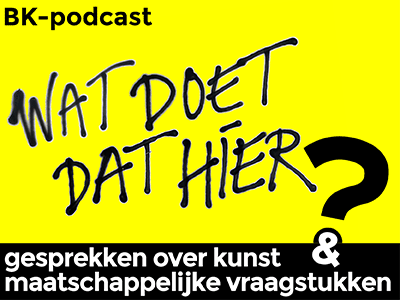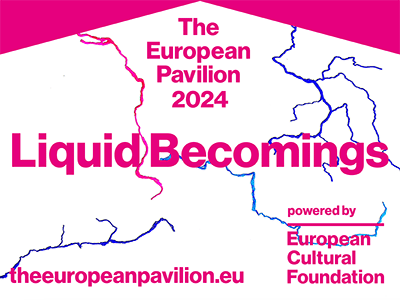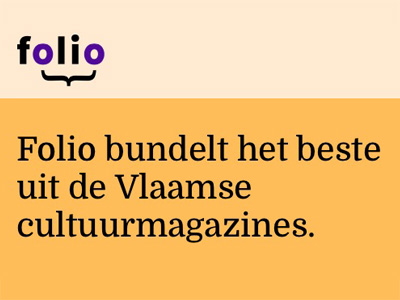Essays
-
Een keuze is altijd een beperking.
Gesprek met Guy Rombouts
Dirk Pültau -
Leestekens
Theodor W. Adorno -
Full stop
Dirk Van Hulle -
Marges worden kaders
Over het boek van morgen
Walter Nikkels -
Gesprek met typograaf en vormgever Filiep Tacq
Dirk Pültau -
Zum-buch-sein
Heidegger, het boek en de letter
Rudi Visker -
Kunstkritiek als politiek schaduwboksen
Over Geheime publiciteit van Sven Lütticken
Rudi Laermans
Besprekingen
-
Dutch Masters. Street Art & Urban Painting
Kees Keijer -
Dan Flavin. une rétrospective
Lieven Van Den Abeele -
Wassily Kandinsky. The Path to Abstraction
Dries Vande Velde -
Idealcity-invisiblecities
Steven ten Thije
-
200 jaar Rijksbouwmeester
Dorine Van Hoogstraten -
FollyDOCK. Ontwerpen voor Heijplaat
Dorine Van Hoogstraten
-
Denkmal II. Jan de Cock
Dries Vande Velde

123
september-oktober 2006
De vorm van de taal
Wij zien taal als informatie. Letters, woorden, zinnen, teksten en boeken zijn cellen, eenheden, pakketten en bundelingen van een onstuitbare communicatiestroom. We weten dat die stroom een drager en een vorm moet krijgen – woorden staan gedrukt of verschijnen op een scherm, een tekst staat in een boek. Maar, zo denken we, eerst de inhoud, dan de vorm. ‘De vorm van de drager communiceert de inhoud van de boodschap’: het lijkt de logica zelve om zo over vorm en inhoud te denken.
De Antwerpse kunstenaar Guy Rombouts heeft een typografisch systeem ontwikkeld dat de zaken omkeert. Hij vervangt de Romeinse letters door lijnstukken (de a wordt ‘angulair’, de z wordt ‘zig-zag’) en tekent daar gesloten woordvormen mee. Deze woorden presenteren zich éérst als vorm en pas dan als inhoud; het zijn woordtekeningen die slechts aan hardnekkige lezers hun betekenis prijsgeven. Het primaat van de ruisloze communicatie wordt dus bekritiseerd – maar Rombouts wil ook aan de kritiek voorbij. Hij maakte bijvoorbeeld een boek in de vorm van het woord boek. In dat geval wordt het gesloten woordbeeld een utopisch teken van een taal die zich met het ding heeft verzoend.
Haast alle teksten in dit nummer gaan over de ‘vormen’ waarin taal verschijnt, vormen die vaak als ‘vorm-zonder-meer’ – als aankleding van de inhoud of als neutrale conventie – worden gezien. Vorm is echter altijd ook inhoud. Dit geldt eveneens voor de oervorm waarmee informatie wordt gebundeld: het boek. In Viskers essay is het boek niet zomaar een drager, maar ook een format dat de taal uit de eindeloze communicatiestroom licht en aldus ‘zin sticht’. Echo’s van Viskers denken over het boek klinken door in het gesprek dat Dirk Pültau voerde met de Vlaamse vormgever en typograaf Filiep Tacq, over de syntaxis van de typograaf en de grammatica van het boek. Als vormgever wil Tacq discreet te werk gaan, maar in de loop van het gesprek wordt duidelijk dat hij meer doet dan het geleiden van inhoudelijke ‘massa’. De typograaf articuleert de betekenis van het materiaal. Hij ontsluit het – waardoor het méér dan materiaal wordt – en misschien kan men zelfs zeggen dat hij het materiaal uitvoert, zoals een vertolker dat doet met een partituur.
De typograaf Walter Nikkels reflecteert over het boek van morgen en over de condities waarin boeken vandaag gemaakt worden. Ook bij hem wordt duidelijk dat de vorm van het boek betekenis heeft: als het architectonische, typografische boek stilaan verdwijnt en moet wijken voor een (beeld)boek zonder marges, dat zich presenteert als een uitsnede van de wereld, dan is dat een betekenisvolle ontwikkeling: het zegt iets over de manier waarop de wereld te boek wordt gesteld. Ten slotte wordt in twee teksten op zoek gegaan naar de prolifererende betekenissen (Dirk Van Hulle over James Joyce) en het mimetische potentieel (Adorno) van het meest conventionele tekstelement: het leesteken – precies het taalteken dat in Rombouts’ typografie ontbreekt.
En ook nog in dit nummer: een bespreking van een boek – Geheime Publiciteit van Sven Lütticken – door Rudi Laermans.







